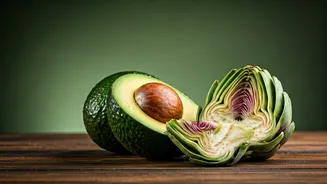Introduction: The Liver's Role
The liver is a vital organ performing a wide array of functions, including detoxification, metabolism, and nutrient storage. It filters blood, removes
toxins, and produces bile, essential for digestion. A healthy liver is fundamental to overall wellness, and poor liver function can lead to various health complications. Dietary choices directly impact the liver's health, making the selection of liver-friendly foods crucial. Incorporating specific fruits and vegetables into one's daily diet can significantly enhance liver function and promote long-term well-being. This guide highlights five such beneficial food items, detailing their specific advantages and how they contribute to a healthier liver. Understanding the impact of these foods is the first step toward promoting optimal liver health.
Berries: Antioxidant Powerhouses
Berries, such as blueberries, strawberries, and raspberries, are packed with antioxidants that combat free radicals and reduce oxidative stress. This protective action is particularly beneficial for the liver, as it shields the organ from damage caused by toxins and inflammation. Regular consumption of berries can improve liver function and protect against conditions like fatty liver disease. The anthocyanins in berries give them their vibrant colors and contribute to their antioxidant properties. These compounds help detoxify the liver and enhance its ability to function correctly. Including a daily serving of berries in your diet is a delicious and effective way to support liver health. Berries are not only tasty but also incredibly versatile, able to be incorporated into smoothies, salads, or enjoyed as a snack.
Broccoli: Cruciferous Champion
Broccoli and other cruciferous vegetables, such as cauliflower and Brussels sprouts, are rich in glucosinolates. These compounds support the liver's detoxification processes. They help activate detoxifying enzymes that flush out harmful substances from the body. Broccoli is known to improve liver function and protect against liver damage. Studies have shown that regular consumption of cruciferous vegetables can reduce the risk of non-alcoholic fatty liver disease (NAFLD). Broccoli can be steamed, roasted, or added to various dishes. Its high fiber content also aids in digestive health, further supporting overall liver function. In essence, broccoli provides a powerful boost to the liver's natural detoxification pathways, maintaining the liver's health.
Leafy Greens: Nutritional Boost
Leafy greens like spinach, lettuce, and kale are rich in chlorophyll and antioxidants, offering substantial benefits to liver health. These nutrients help to detoxify the liver and protect it from damage. Leafy greens are also a good source of fiber, which aids digestion and promotes healthy bowel movements, reducing the burden on the liver. The vitamins and minerals found in leafy greens support overall health, contributing to improved liver function. Spinach, for example, is easy to incorporate into salads, smoothies, or cooked dishes. These greens are low in calories and high in nutritional value, making them a superb addition to any diet focused on liver health. Incorporating leafy greens regularly provides essential nutrients to improve overall wellness.
Carrots: Beta-Carotene Benefits
Carrots are abundant in beta-carotene, which the body converts into vitamin A, crucial for liver health. Vitamin A acts as an antioxidant, protecting the liver from damage caused by free radicals and toxins. Carrots also contain fiber, aiding in digestion and preventing liver stress. Consuming carrots on a regular basis supports the liver's ability to eliminate waste and detoxify the body. They are versatile, and can be eaten raw, juiced, or added to a range of cooked dishes. The combination of beta-carotene, fiber, and other nutrients makes carrots an excellent choice for maintaining a healthy liver. They contribute significantly to the liver's ability to function properly and efficiently.
Pomegranate: Antioxidant Support
Pomegranate, renowned for its rich antioxidant content, plays a crucial role in safeguarding liver health. These powerful antioxidants combat oxidative stress, minimizing the risk of liver damage. Pomegranates can support the liver's detoxification process, helping to eliminate harmful substances from the body. Including pomegranate in your diet can contribute to improved liver function and overall well-being. Its seeds can be added to salads, smoothies, or enjoyed on their own. The compounds present in pomegranate help protect the liver cells from damage and inflammation. Adding pomegranate to your daily diet is a delicious and effective method for fostering a healthy liver.















